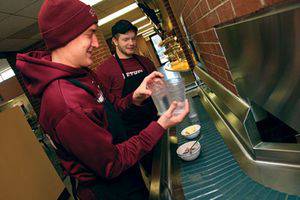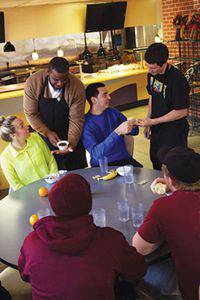Students in Bobby Lloyd’s interterm class practice servanthood in the model of Jesus—and make an impact.
 D.J. Bronson, left, and Josh Kaufman, students in the Topics in Management interterm class, return dishes to the dishwashing window for some of their fellow students. Photo by Vada Snider.
D.J. Bronson, left, and Josh Kaufman, students in the Topics in Management interterm class, return dishes to the dishwashing window for some of their fellow students. Photo by Vada Snider.For Interterm 2014, Bobby Lloyd, assistant professor of business and economics, taught a section of Topics in Management, focusing on leadership.
Bobby’s approach was to teach leadership from different aspects: what makes leaders; the dynamics of the follower relationship; what characteristics and behaviors enhance or detract from good leadership.
In one particular lesson during the interterm intensive, we were talking about servant leadership—the effect it has on your peers if you’re seen as a servant leader,
Bobby said.
Part of the lesson was hands-on. One day at noon, the class of seven students served their peers coming in for lunch.
One person greeted people as they came in,Bobby said.The rest of us walked among the tables, refilling drink glasses, taking dishes to the window, standing in the serving line to get food for others.
The class asked the students who were served to fill out surveys afterward. Response was overwhelmingly positive: It was very pleasant and a great surprise
; I enjoyed the individual attention
; It makes me want to help others in return
; Could this be a Wednesday regular?
The Topics in Management class also went to the Catholic Care Center in Wichita, where they spent an hour one-on-one with residents.
Later, we talked about how taking time to make someone feel important can change the course of their day or week,
Bobby said.
Why emphasize servant leadership? It’s the most important, the most impactful style of leadership. It draws out the human element of connecting with people.
I tell the students,Even the secular philosophers and academicians recognize Jesus Christ as the best example of servant leadership.
Of course, Jesus is our model, as Christians. We talk about washing feet. The disciples told Jesus he was the master and shouldn’t be doing this for them. Jesus replied,
If I’m the master and I’m washing your feet, how much more should you do this.
When I was first enrolled in this year’s interterm Leadership class, my first thoughts were to expect what might typically be associated with leadership.
 Marvin Rice, left, and Preston Kolbeck serve coffee and muffins to Hayley Morrical and Adam Arciniega. Photo by Vada Snider.
Marvin Rice, left, and Preston Kolbeck serve coffee and muffins to Hayley Morrical and Adam Arciniega. Photo by Vada Snider.I thought we would be learning about integrity and how to inspire people, and discussing topics related to what leadership is all about.
I never would have imagined that for this class we would end up putting on some very flattering black aprons and serving our fellow students in the cafeteria. This activity was not only something unexpected, for both me and my classmates—it also taught our entire class a very important lesson: servant leadership is one of the most impactful ways to lead.
After we spent an hour refilling glasses, taking dirty dishes to the window and providing a whole lot of smiles, we passed out surveys to record how much impact we had on those that we served.
Reading these surveys in class provided the insight into just how much impact a small service can provide for people. Almost all the reviews were extremely positive. Some even commented about how this small gesture had made their entire day.
This project, which seemed unnecessary at first, provided the backing for the idea thatservant leadership has the potential to be the most important/impactful kind of leadership.
During the afternoon portion of our servant leadership day, our class traveled to Wichita to spend time at a local nursing home. While there, we visited, both collectively and individually, with some of the residents.
This act of service was also very impactful, because it was almost instantaneously obvious that by just sitting down and having a conversation, we had left these folks with a great impression. Something as simple as talking to a resident in nursing care can change their mood, their day and quite possibly the rest of their life.
You never know what impact you fully have on someone. For example, if there were ever someone in your life who was contemplating suicide, a simple smile in passing could change their day, and ultimately their life.
In the end, these simple service projects gave me the insight and realization that although I may have affected the people I interacted with, they also had a vast impact on me. This experience opened my eyes to the fact that servant leadership, if done correctly and often, can in fact be the best form of leadership.
This course was technically considered a business course, so although I feel it is very much applicable to all majors, I would be doing an injustice not to say that these projects will certainly impact my future business practices.
It’s not that I have not done service projects before, because I most definitely have. But putting service in the context of leadership opened my eyes to the social responsibility that businesses have to society.
For this reason, and others, when I become a leader later on in life, I will for sure try to incorporate as much servant leadership into my business practices as possible. After all, you never know how much a smile or a small act of service can impact the recipients of that action, especially if it is coming from a well-respected leader.